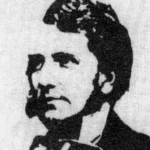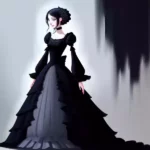 | |
The Murdered Cousin | |
| Author | Joseph Sheridan Le Fanu |
|---|---|
| Published |
1839
|
| Language | English |
| Nationality | Irish |
| Genre | Gothic Fiction, Supernatural |
1839 Short Story
The Murdered Cousin
The Murdered Cousin is an English Gothic Fiction, Supernatural short story by Irish writer Joseph Sheridan Le Fanu. It was first published in 1839. This short story was later expanded as Le Fanu's famous Victorian Gothic novel Uncle Silas.
The Murdered Cousin
by Joseph Sheridan Le Fanu
- “And they lay wait for their own blood: they lurk privily for their own lives.
- “So are the ways of every one that is greedy of gain; which taketh away the life of the owner thereof.”
This story of the Irish peerage is written, as nearly as possible, in the very words in which it was related by its “heroine,” the late Countess D, and is therefore told in the first person.
My mother died when I was an infant, and of her I have no recollection, even the faintest. By her death my education was left solely to the direction of my surviving parent. He entered upon his task with a stern appreciation of the responsibility thus cast upon him. My religious instruction was prosecuted with an almost exaggerated anxiety; and I had, of course, the best masters to perfect me in all those accomplishments which my station and wealth might seem to require. My father was what is called an oddity, and his treatment of me, though uniformly kind, was governed less by affection and tenderness, than by a high and unbending sense of duty. Indeed I seldom saw or spoke to him except at meal-times, and then, though gentle, he was usually reserved and gloomy. His leisure hours, which were many, were passed either in his study or in solitary walks; in short, he seemed to take no further interest in my happiness or improvement, than a conscientious regard to the discharge of his own duty would seem to impose.
Shortly before my birth an event occurred which had contributed much to induce and to confirm my father’s unsocial habits; it was the fact that a suspicion of murder had fallen upon his younger brother, though not sufficiently definite to lead to any public proceedings, yet strong enough to ruin him in public opinion. This disgraceful and dreadful doubt cast upon the family name, my father felt deeply and bitterly, and not the less so that he himself was thoroughly convinced of his brother’s innocence. The sincerity and strength of this conviction he shortly afterwards proved in a manner which produced the catastrophe of my story.
Before, however, I enter upon my immediate adventures, I ought to relate the circumstances which had awakened that suspicion to which I have referred, inasmuch as they are in themselves somewhat curious, and in their effects most intimately connected with my own after-history.
My uncle, Sir Arthur Tyrrell, was a gay and extravagant man, and, among other vices, was ruinously addicted to gaming. This unfortunate propensity, even after his fortune had suffered so severely as to render retrenchment imperative, nevertheless continued to engross him, nearly to the exclusion of every other pursuit. He was, however, a proud, or rather a vain man, and could not bear to make the diminution of his income a matter of triumph to those with whom he had hitherto competed; and the consequence was, that he frequented no longer the expensive haunts of his dissipation, and retired from the gay world, leaving his coterie to discover his reasons as best they might. He did not, however, forego his favourite vice, for though he could not worship his great divinity in those costly temples where he was formerly wont to take his place, yet he found it very possible to bring about him a sufficient number of the votaries of chance to answer all his ends. The consequence was, that Carrickleigh, which was the name of my uncle’s residence, was never without one or more of such visiters as I have described. It happened that upon one occasion he was visited by one Hugh Tisdall, a gentleman of loose, and, indeed, low habits, but of considerable wealth, and who had, in early youth, travelled with my uncle upon the Continent. The period of this visit was winter, and, consequently, the house was nearly deserted excepting by its ordinary inmates; it was, therefore, highly acceptable, particularly as my uncle was aware that his visiter’s tastes accorded exactly with his own.
Both parties seemed determined to avail themselves of their mutual suitability during the brief stay which Mr. Tisdall had promised; the consequence was, that they shut themselves up in Sir Arthur’s private room for nearly all the day and the greater part of the night, during the space of almost a week, at the end of which the servant having one morning, as usual, knocked at Mr. Tisdall’s bed-room door repeatedly, received no answer, and, upon attempting to enter, found that it was locked. This appeared suspicious, and the inmates of the house having been alarmed, the door was forced open, and, on proceeding to the bed, they found the body of its occupant perfectly lifeless, and hanging halfway out, the head downwards, and near the floor. One deep wound had been inflicted upon the temple, apparently with some blunt instrument, which had penetrated the brain, and another blow, less effectiveprobably the first aimedhad grazed his head, removing some of the scalp. The door had been double locked upon the inside, in evidence of which the key still lay where it had been placed in the lock. The window, though not secured on the interior, was closed; a circumstance not a little puzzling, as it afforded the only other mode of escape from the room. It looked out, too, upon a kind of court-yard, round which the old buildings stood, formerly accessible by a narrow doorway and passage lying in the oldest side of the quadrangle, but which had since been built up, so as to preclude all ingress or egress; the room was also upon the second story, and the height of the window considerable; in addition to all which the stone window-sill was much too narrow to allow of any one’s standing upon it when the window was closed. Near the bed were found a pair of razors belonging to the murdered man, one of them upon the ground, and both of them open. The weapon which inflicted the mortal wound was not to be found in the room, nor were any footsteps or other traces of the murderer discoverable. At the suggestion of Sir Arthur himself, the coroner was instantly summoned to attend, and an inquest was held. Nothing, however, in any degree conclusive was elicited. The walls, ceiling, and floor of the room were carefully examined, in order to ascertain whether they contained a trap-door or other concealed mode of entrance, but no such thing appeared. Such was the minuteness of investigation employed, that, although the grate had contained a large fire during the night, they proceeded to examine even the very chimney, in order to discover whether escape by it were possible. But this attempt, too, was fruitless, for the chimney, built in the old fashion, rose in a perfectly perpendicular line from the hearth, to a height of nearly fourteen feet above the roof, affording in its interior scarcely the possibility of ascent, the flue being smoothly plastered, and sloping towards the top like an inverted funnel; promising, too, even if the summit were attained, owing to its great height, but a precarious descent upon the sharp and steep-ridged roof; the ashes, too, which lay in the grate, and the soot, as far as it could be seen, were undisturbed, a circumstance almost conclusive upon the point.
Sir Arthur was of course examined. His evidence was given with clearness and unreserve, which seemed calculated to silence all suspicion. He stated that, up to the day and night immediately preceding the catastrophe, he had lost to a heavy amount, but that, at their last sitting, he had not only won back his original loss, but upwards of £4,000 in addition; in evidence of which he produced an acknowledgment of debt to that amount in the handwriting of the deceased, bearing date the night of the catastrophe. He had mentioned the circumstance to Lady Tyrrell, and in presence of some of his domestics; which statement was supported by their respective evidence. One of the jury shrewdly observed, that the circumstance of Mr. Tisdall’s having sustained so heavy a loss might have suggested to some ill-minded persons, accidentally hearing it, the plan of robbing him, after having murdered him in such a manner as might make it appear that he had committed suicide; a supposition which was strongly supported by the razors having been found thus displaced and removed from their case. Two persons had probably been engaged in the attempt, one watching by the sleeping man, and ready to strike him in case of his awakening suddenly, while the other was procuring the razors and employed in inflicting the fatal gash, so as to make it appear to have been the act of the murdered man himself. It was said that while the juror was making this suggestion Sir Arthur changed colour. There was nothing, however, like legal evidence to implicate him, and the consequence was that the verdict was found against a person or persons unknown, and for some time the matter was suffered to rest, until, after about five months, my father received a letter from a person signing himself Andrew Collis, and representing himself to be the cousin of the deceased. This letter stated that his brother, Sir Arthur, was likely to incur not merely suspicion but personal risk, unless he could account for certain circumstances connected with the recent murder, and contained a copy of a letter written by the deceased, and dated the very day upon the night of which the murder had been perpetrated. Tisdall’s letter contained, among a great deal of other matter, the passages which follow:
“I have had sharp work with Sir Arthur: he tried some of his stale tricks, but soon found that I was Yorkshire, too; it would not doyou understand me. We went to the work like good ones, head, heart, and soul; and in fact, since I came here, I have lost no time. I am rather fagged, but I am sure to be well paid for my hardship; I never want sleep so long as I can have the music of a dice-box, and wherewithal to pay the piper. As I told you, he tried some of his queer turns, but I foiled him like a man, and, in return, gave him more than he could relish of the genuine dead knowledge. In short, I have plucked the old baronet as never baronet was plucked before; I have scarce left him the stump of a quill. I have got promissory notes in his hand to the amount of ; if you like round numbers, say five-and-twenty thousand pounds, safely deposited in my portable strong box, alias, double-clasped pocket-book. I leave this ruinous old rat-hole early on to-morrow, for two reasons: first, I do not want to play with Sir Arthur deeper than I think his security would warrant; and, secondly, because I am safer a hundred miles away from Sir Arthur than in the house with him. Look you, my worthy, I tell you this between ourselvesI may be wrongbut, by , I am sure as that I am now living, that Sir A attempted to poison me last night. So much for old friendship on both sides. When I won the last stake, a heavy one enough, my friend leant his forehead upon his hands, and you’ll laugh when I tell you that his head literally smoked like a hot dumpling. I do not know whether his agitation was produced by the plan which he had against me, or by his having lost so heavily; though it must be allowed that he had reason to be a little funked, whichever way his thoughts went; but he pulled the bell, and ordered two bottles of Champagne. While the fellow was bringing them, he wrote a promissory note to the full amount, which he signed, and, as the man came in with the bottles and glasses, he desired him to be off. He filled a glass for me, and, while he thought my eyes were off, for I was putting up his note at the time, he dropped something slyly into it, no doubt to sweeten it; but I saw it all, and, when he handed it to me, I said, with an emphasis which he might easily understand, ‘There is some sediment in it, I’ll not drink it.’ ‘Is there?’ said he, and at the same time snatched it from my hand and threw it into the fire. What do you think of that? Have I not a tender bird in hand? Win or lose, I will not play beyond five thousand to-night, and to-morrow sees me safe out of the reach of Sir Arthur’s Champagne.”
Of the authenticity of this document, I never heard my father express a doubt; and I am satisfied that, owing to his strong conviction in favour of his brother, he would not have admitted it without sufficient inquiry, inasmuch as it tended to confirm the suspicions which already existed to his prejudice. Now, the only point in this letter which made strongly against my uncle, was the mention of the “double-clasped pocket-book,” as the receptacle of the papers likely to involve him, for this pocket-book was not forthcoming, nor anywhere to be found, nor had any papers referring to his gaming transactions been discovered upon the dead man.
But whatever might have been the original intention of this man, Collis, neither my uncle nor my father ever heard more of him; he published the letter, however, in Faulkner’s newspaper, which was shortly afterwards made the vehicle of a much more mysterious attack. The passage in that journal to which I allude, appeared about four years afterwards, and while the fatal occurrence was still fresh in public recollection. It commenced by a rambling preface, stating that “a certain person whom certain persons thought to be dead, was not so, but living, and in full possession of his memory, and moreover, ready and able to make great delinquents tremble”: it then went on to describe the murder, without, however, mentioning names; and in doing so, it entered into minute and circumstantial particulars of which none but an eye-witness could have been possessed, and by implications almost too unequivocal to be regarded in the light of insinuation, to involve the “titled gambler” in the guilt of the transaction.
My father at once urged Sir Arthur to proceed against the paper in an action of libel, but he would not hear of it, nor consent to my father’s taking any legal steps whatever in the matter. My father, however, wrote in a threatening tone to Faulkner, demanding a surrender of the author of the obnoxious article; the answer to this application is still in my possession, and is penned in an apologetic tone: it states that the manuscript had been handed in, paid for, and inserted as an advertisement, without sufficient inquiry, or any knowledge as to whom it referred. No step, however, was taken to clear my uncle’s character in the judgment of the public; and, as he immediately sold a small property, the application of the proceeds of which were known to none, he was said to have disposed of it to enable himself to buy off the threatened information; however the truth might have been, it is certain that no charges respecting the mysterious murder were afterwards publicly made against my uncle, and, as far as external disturbances were concerned, he enjoyed henceforward perfect security and quiet.
A deep and lasting impression, however, had been made upon the public mind, and Sir Arthur Tyrrell was no longer visited or noticed by the gentry of the county, whose attentions he had hitherto received. He accordingly affected to despise those courtesies which he no longer enjoyed, and shunned even that society which he might have commanded. This is all that I need recapitulate of my uncle’s history, and I now recur to my own.
Although my father had never, within my recollection, visited, or been visited by my uncle, each being of unsocial, procrastinating, and indolent habits, and their respective residences being very far apartthe one lying in the county of Galway, the other in that of Corkhe was strongly attached to his brother, and evinced his affection by an active correspondence, and by deeply and proudly resenting that neglect which had branded Sir Arthur as unfit to mix in society.
When I was about eighteen years of age, my father, whose health had been gradually declining, died, leaving me in heart wretched and desolate, and, owing to his habitual seclusion, with few acquaintances, and almost no friends. The provisions of his will were curious, and when I was sufficiently come to myself to listen to, or comprehend them, surprised me not a little: all his vast property was left to me, and to the heirs of my body, for ever; and, in default of such heirs, it was to go after my death to my uncle, Sir Arthur, without any entail. At the same time, the will appointed him my guardian, desiring that I might be received within his house, and reside with his family, and under his care, during the term of my minority; and in consideration of the increased expense consequent upon such an arrangement, a handsome allowance was allotted to him during the term of my proposed residence. The object of this last provision I at once understood; my father desired, by making it the direct apparent interest of Sir Arthur that I should die without issue, while at the same time he placed my person wholly in his power, to prove to the world how great and unshaken was his confidence in his brother’s innocence and honour. It was a strange, perhaps an idle scheme, but as I had been always brought up in the habit of considering my uncle as a deeply injured man, and had been taught, almost as a part of my religion, to regard him as the very soul of honour, I felt no further uneasiness respecting the arrangement than that likely to affect a shy and timid girl at the immediate prospect of taking up her abode for the first time in her life among strangers. Previous to leaving my home, which I felt I should do with a heavy heart, I received a most tender and affectionate letter from my uncle, calculated, if anything could do so, to remove the bitterness of parting from scenes familiar and dear from my earliest childhood, and in some degree to reconcile me to the measure. It was upon a fine autumn day that I approached the old domain of Carrickleigh. I shall not soon forget the impression of sadness and of gloom which all that I saw produced upon my mind; the sunbeams were falling with a rich and melancholy lustre upon the fine old trees, which stood in lordly groups, casting their long sweeping shadows over rock and sward; there was an air of neglect and decay about the spot, which amounted almost to desolation, and mournfully increased as we approached the building itself, near which the ground had been originally more artificially and carefully cultivated than elsewhere, and where consequently neglect more immediately and strikingly betrayed itself.
As we proceeded, the road wound near the beds of what had been formerly two fish-ponds, which were now nothing more than stagnant swamps, overgrown with rank weeds, and here and there encroached upon by the straggling underwood; the avenue itself was much broken; and in many places the stones were almost concealed by grass and nettles; the loose stone walls which had here and there intersected the broad park, were, in many places, broken down, so as no longer to answer their original purpose as fences; piers were now and then to be seen, but the gates were gone; and to add to the general air of dilapidation, some huge trunks were lying scattered through the venerable old trees, either the work of the winter storms, or perhaps the victims of some extensive but desultory scheme of denudation, which the projector had not capital or perseverance to carry into full effect.
After the carriage had travelled a full mile of this avenue, we reached the summit of a rather abrupt eminence, one of the many which added to the picturesqueness, if not to the convenience of this rude approach; from the top of this ridge the grey walls of Carrickleigh were visible, rising at a small distance in front, and darkened by the hoary wood which crowded around them; it was a quadrangular building of considerable extent, and the front, where the great entrance was placed, lay towards us, and bore unequivocal marks of antiquity; the time-worn, solemn aspect of the old building, the ruinous and deserted appearance of the whole place, and the associations which connected it with a dark page in the history of my family, combined to depress spirits already predisposed for the reception of sombre and dejecting impressions. When the carriage drew up in the grass-grown court-yard before the hall-door, two lazy-looking men, whose appearance well accorded with that of the place which they tenanted, alarmed by the obstreperous barking of a great chained dog, ran out from some half-ruinous outhouses, and took charge of the horses; the hall-door stood open, and I entered a gloomy and imperfectly-lighted apartment, and found no one within it. However, I had not long to wait in this awkward predicament, for before my luggage had been deposited in the house, indeed before I had well removed my cloak and other muffles, so as to enable me to look around, a young girl ran lightly into the hall, and kissing me heartily and somewhat boisterously exclaimed, “My dear cousin, my dear MargaretI am so delightedso out of breath, we did not expect you till ten o’clock; my father is somewhere about the place, he must be close at hand. JamesCorneyrun out and tell your master; my brother is seldom at home, at least at any reasonable hour; you must be so tiredso fatiguedlet me show you to your room; see that Lady Margaret’s luggage is all brought up; you must lie down and rest yourself. Deborah, bring some coffeeup these stairs; we are so delighted to see youyou cannot think how lonely I have been; how steep these stairs are, are not they? I am so glad you are comeI could hardly bring myself to believe that you were really coming; how good of you, dear Lady Margaret.” There was real good nature and delight in my cousin’s greeting, and a kind of constitutional confidence of manner which placed me at once at ease, and made me feel immediately upon terms of intimacy with her. The room into which she ushered me, although partaking in the general air of decay which pervaded the mansion and all about it, had, nevertheless, been fitted up with evident attention to comfort, and even with some dingy attempt at luxury; but what pleased me most was that it opened, by a second door, upon a lobby which communicated with my fair cousin’s apartment; a circumstance which divested the room, in my eyes, of the air of solitude and sadness which would otherwise have characterised it, to a degree almost painful to one so depressed and agitated as I was.
After such arrangements as I found necessary were completed, we both went down to the parlour, a large wainscotted room, hung round with grim old portraits, and, as I was not sorry to see, containing, in its ample grate, a large and cheerful fire. Here my cousin had leisure to talk more at her ease; and from her I learned something of the manners and the habits of the two remaining members of her family, whom I had not yet seen. On my arrival I had known nothing of the family among whom I was come to reside, except that it consisted of three individuals, my uncle, and his son and daughter, Lady Tyrrell having been long dead; in addition to this very scanty stock of information, I shortly learned from my communicative companion, that my uncle was, as I had suspected, completely retired in his habits, and besides that, having been, so far back as she could well recollect, always rather strict, as reformed rakes frequently become, he had latterly been growing more gloomily and sternly religious than heretofore. Her account of her brother was far less favourable, though she did not say anything directly to his disadvantage. From all that I could gather from her, I was led to suppose that he was a specimen of the idle, coarse-mannered, profligate “squirearchy“a result which might naturally have followed from the circumstance of his being, as it were, outlawed from society, and driven for companionship to grades below his ownenjoying, too, the dangerous prerogative of spending a good deal of money. However, you may easily suppose that I found nothing in my cousin’s communication fully to bear me out in so very decided a conclusion.
I awaited the arrival of my uncle, which was every moment to be expected, with feelings half of alarm, half of curiositya sensation which I have often since experienced, though to a less degree, when upon the point of standing for the first time in the presence of one of whom I have long been in the habit of hearing or thinking with interest. It was, therefore, with some little perturbation that I heard, first a slight bustle at the outer door, then a slow step traverse the hall, and finally witnessed the door open, and my uncle enter the room. He was a striking looking man; from peculiarities both of person and of dress, the whole effect of his appearance amounted to extreme singularity. He was tall, and when young his figure must have been strikingly elegant; as it was, however, its effect was marred by a very decided stoop; his dress was of a sober colour, and in fashion anterior to any thing which I could remember. It was, however, handsome, and by no means carelessly put on; but what completed the singularity of his appearance was his uncut, white hair, which hung in long, but not at all neglected curls, even so far as his shoulders, and which combined with his regularly classic features, and fine dark eyes, to bestow upon him an air of venerable dignity and pride, which I have seldom seen equalled elsewhere. I rose as he entered, and met him about the middle of the room; he kissed my cheek and both my hands, saying
“You are most welcome, dear child, as welcome as the command of this poor place and all that it contains can make you. I am rejoiced to see youtruly rejoiced. I trust that you are not much fatigued; pray be seated again.” He led me to my chair, and continued, “I am glad to perceive you have made acquaintance with Emily already; I see, in your being thus brought together, the foundation of a lasting friendship. You are both innocent, and both young. God bless youGod bless you, and make you all that I could wish.”
He raised his eyes, and remained for a few moments silent, as if in secret prayer. I felt that it was impossible that this man, with feelings manifestly so tender, could be the wretch that public opinion had represented him to be. I was more than ever convinced of his innocence. His manners were, or appeared to me, most fascinating. I know not how the lights of experience might have altered this estimate. But I was then very young, and I beheld in him a perfect mingling of the courtesy of polished life with the gentlest and most genial virtues of the heart. A feeling of affection and respect towards him began to spring up within me, the more earnest that I remembered how sorely he had suffered in fortune and how cruelly in fame. My uncle having given me fully to understand that I was most welcome, and might command whatever was his own, pressed me to take some supper; and on my refusing, he observed that, before bidding me good night, he had one duty further to perform, one in which he was convinced I would cheerfully acquiesce. He then proceeded to read a chapter from the Bible; after which he took his leave with the same affectionate kindness with which he had greeted me, having repeated his desire that I should consider every thing in his house as altogether at my disposal. It is needless to say how much I was pleased with my uncleit was impossible to avoid being so; and I could not help saying to myself, if such a man as this is not safe from the assaults of slander, who is? I felt much happier than I had done since my father’s death, and enjoyed that night the first refreshing sleep which had visited me since that calamity. My curiosity respecting my male cousin did not long remain unsatisfied; he appeared upon the next day at dinner. His manners, though not so coarse as I had expected, were exceedingly disagreeable; there was an assurance and a forwardness for which I was not prepared; there was less of the vulgarity of manner, and almost more of that of the mind, than I had anticipated. I felt quite uncomfortable in his presence; there was just that confidence in his look and tone, which would read encouragement even in mere toleration; and I felt more disgusted and annoyed at the coarse and extravagant compliments which he was pleased from time to time to pay me, than perhaps the extent of the atrocity might fully have warranted. It was, however, one consolation that he did not often appear, being much engrossed by pursuits about which I neither knew nor cared anything; but when he did, his attentions, either with a view to his amusement, or to some more serious object, were so obviously and perseveringly directed to me, that young and inexperienced as I was, even I could not be ignorant of their significance. I felt more provoked by this odious persecution than I can express, and discouraged him with so much vigour, that I did not stop even at rudeness to convince him that his assiduities were unwelcome; but all in vain.
This had gone on for nearly a twelvemonth, to my infinite annoyance, when one day, as I was sitting at some needlework with my companion, Emily, as was my habit, in the parlour, the door opened, and my cousin Edward entered the room. There was something, I thought, odd in his manner, a kind of struggle between shame and impudence, a kind of flurry and ambiguity, which made him appear, if possible, more than ordinarily disagreeable.
“Your servant, ladies,” he said, seating himself at the same time; “sorry to spoil your tête-à-tête; but never mind, I’ll only take Emily’s place for a minute or two, and then we part for a while, fair cousin. Emily, my father wants you in the corner turret; no shilly, shally, he’s in a hurry.” She hesitated. “Be offtramp, march, I say,” he exclaimed, in a tone which the poor girl dared not disobey.
She left the room, and Edward followed her to the door. He stood there for a minute or two, as if reflecting what he should say, perhaps satisfying himself that no one was within hearing in the hall. At length he turned about, having closed the door, as if carelessly, with his foot, and advancing slowly, in deep thought, he took his seat at the side of the table opposite to mine. There was a brief interval of silence, after which he said:
“I imagine that you have a shrewd suspicion of the object of my early visit; but I suppose I must go into particulars. Must I?”
“I have no conception,” I replied, “what your object may be.”
“Well, well,” said he becoming more at his ease as he proceeded, “it may be told in a few words. You know that it is totally impossible, quite out of the question, that an off-hand young fellow like me, and a good-looking girl like yourself, could meet continually as you and I have done, without an attachmenta liking growing up on one side or other; in short, I think I have let you know as plainly as if I spoke it, that I have been in love with you, almost from the first time I saw you.” He paused, but I was too much horrified to speak. He interpreted my silence favourably. “I can tell you,” he continued, “I’m reckoned rather hard to please, and very hard to hit. I can’t say when I was taken with a girl before, so you see fortune reserved me.”
Here the odious wretch actually put his arm round my waist: the action at once restored me to utterance, and with the most indignant vehemence I released myself from his hold, and at the same time said:
“I have, sir, of course, perceived your most disagreeable attentions; they have long been a source of great annoyance to me; and you must be aware that I have marked my disapprobation, my disgust, as unequivocally as I possibly could, without actual indelicacy.”
I paused, almost out of breath from the rapidity with which I had spoken; and without giving him time to renew the conversation, I hastily quitted the room, leaving him in a paroxysm of rage and mortification. As I ascended the stairs, I heard him open the parlour-door with violence, and take two or three rapid strides in the direction in which I was moving. I was now much frightened, and ran the whole way until I reached my room, and having locked the door, I listened breathlessly, but heard no sound. This relieved me for the present; but so much had I been overcome by the agitation and annoyance attendant upon the scene which I had just passed through, that when my cousin Emily knocked at the door, I was weeping in great agitation







